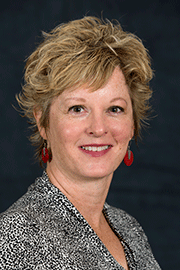Improving disparities in diet-related health
With new NIH funding, the Home Food Inventory undergoes update and testing
April 7, 2021
Brett Stursa

In 2008, Professor Jayne Fulkerson, PhD, led the development of a Home Food Inventory with her colleagues in the School of Public Health to assess the healthfulness and obesity risk of home food environments.
“We wanted to be able to better assess the food environments of the participants in our studies to determine which foods were kept in the home that may or may not contribute to healthy eating and obesity,” says Fulkerson.
The user-administered Home Food Inventory has since been used extensively by both Fulkerson’s team and others throughout the country in observational and randomized controlled trial studies, including those funded by the National Institutes of Health.
Yet, the original Home Food Inventory can only be used with English-speaking populations, is lengthy and paper-based. Fulkerson recently received funding from the National Cancer Institute to develop an accessible home food environment assessment toolkit that includes valid and reliable paper and multi-media electronic tools targeting foods known to impact diet-related health that can be user-administered across literacy levels and in English and Spanish.

“Latinos are the largest immigrant population in the United States but they share an uneven burden of chronic disease including risk for cardiovascular disease, obesity and diabetes,” says Fulkerson. “Understanding the factors related to disease risk and developing culturally-appropriate population-level interventions are critical to reduce health disparities.”
Research is often stymied by the lack of measurement tools that are specific, appropriate and valid for diverse populations. Fulkerson expects the updated and validated paper and electronic versions of the Home Food Inventory to assist in that research.
Fulkerson is partnering with Melissa Laska, PhD, RD (UMN School of Public Health), Mary Hearst, PhD, MPH (St. Catherine’s University), Cynthia Davey, MS (CTSI BDAC), and Leslie Lytle, PhD (consultant), as well as Jon Moon and MEI Research, all whom worked on previous research related to the Home Food Inventory. Uriyoan Colon-Ramos, ScD, MPA (The George Washington University), will also consult to ensure the updated Home Food Inventory better reflects Latino dietary intake.
“The new Home Food Inventory tools will be used to identify the kinds of foods that put people at risk for diet-related diseases and understand that better,” says Fulkerson. “Identifying these health risks lead to the development of better interventions. When you’re trying to intervene in the home food environment, you want to be able to measure that change and this tool will provide that.”

